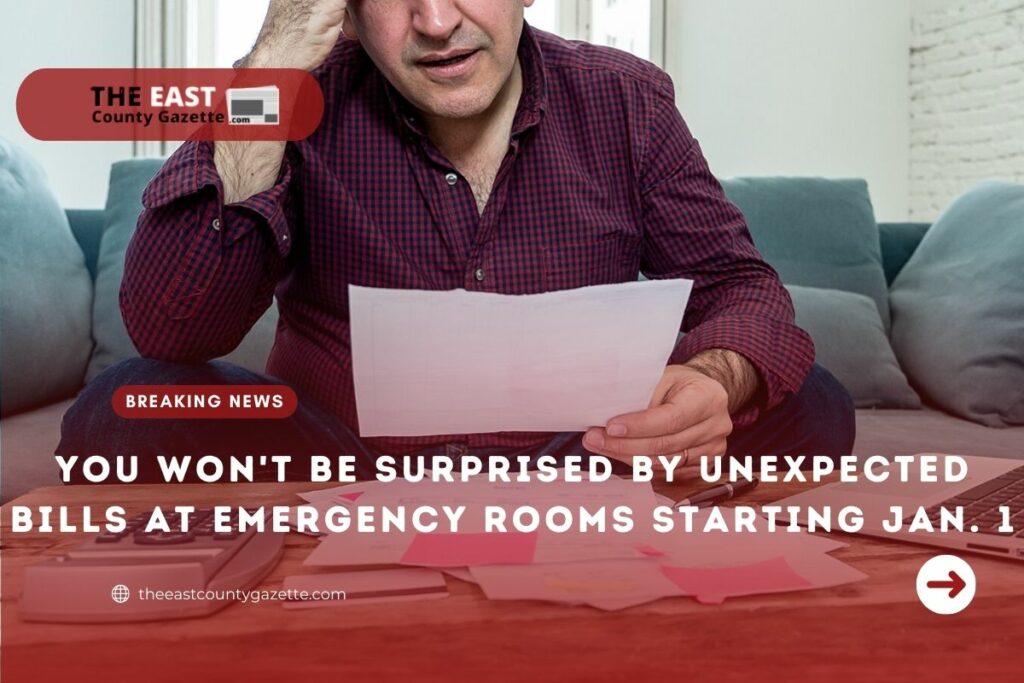Starting in January 2022, you shouldn’t be surprised with unexpected bills at the emergency room
In the event you have ever received an unexpected out-of-network medical bill, some protections are on their way.
CNBC reports that the new consumer protection law, “No Surprises Act,” will take effect on Jan. 1, 2022. Under this law, almost all surprise billings or balance bills will be banned.
According to the Kaiser Family Foundation, these surprise billings happen in about one in five emergency room visits. This usually is the case during an appointment as an anesthesiologist, radiologist, or intensivist who is not covered by your insurance may be needed, even if you make sure you choose an in-network physician.
In many cases, ancillary services are located at the same location as an in-network provider, which only makes it more difficult for consumers to determine what’s covered by their insurance plans, according to Patricia Kelmar, director of health care campaigns at U.S. PIRG.
“It takes advantage of people at their most vulnerable moment,” she said, claiming that patients often aren’t able to be knowledgeable about their insurance coverage, particularly when they need emergency care.
“It’s not like you’re given a bunch of offers of who you can choose as a provider,” Kelmar continued.
“The last thing you’re doing at that point is checking network status and asking for cost estimates.”
Recommended Read: How to Avail American Opportunity Tax Credit Up to $2,500?
Understanding the Surprising Medical Bills
Private insurers, as well as those that provide coverage through the Affordable Care Act’s marketplace, must comply with the new rules.
The following scenarios should no longer lead to patients receiving a surprise medical bill from out-of-network providers as of Jan. 1:
- When you receive emergency care in an emergency room
- When you receive any care at an in-network healthcare facility
- When you are transported by an air ambulance (airplane or helicopter)
Consumers no longer will have to act as a middleman between their providers and insurers, and will only be charged for services rendered within the network. Insurance companies and out-of-network medical providers will work out any out-of-network pay.
By the law discrepancies between insurers and providers have 30co days to be resolved, and a new arbitration process has been established for them to resolve disputes.
Considerations to Keep in Mind
Emergency rooms and urgent-care centers offering emergency services are the only entities covered by these new federal protections. Furthermore, they apply to in-network hospitals, physicians’ offices, and ambulatory surgery centers.
The protections mentioned above do not apply, however, to non-emergency care provided in places such as addiction treatment facilities, birthing centers, clinics, hospices, nursing homes, and urgent-care centers. There is no license to provide emergency services at these centers. Particularly for urgent-care centers, it is crucial to ensure that the facilities and services they provide are in-network.
Furthermore, despite having little control over who delivers the ambulance service, the No Surprises Act won’t cover ground ambulance transportation. So, you might still get an ambulance bill from an out-of-network provider. Some states offer special protections for ground ambulances if they receive a surprise bill, otherwise, Kelmar advises negotiating your bill with the ambulance company.
Must read: Student Debt Cancellation is Insult to Millions of Americans. Here’s Why?
Here are a Few Ways to Keep Yourself from Getting Surprised By a Bill
There are times when it’s difficult to get a straight answer from a healthcare provider about what your insurance covers. Kelmar suggests you ask, “Are you part of my plan’s network?” and not, “Do you take my insurance?”, as that will give you a better idea of what to expect for costs.
It is possible that doctors outside of your network will ask you to sign the Surprise Billing Protection Form. Until you’ve read it carefully and know the charges fully, Kelmar recommends that you don’t sign it.
It is illegal for emergency doctors and facilities, assistant surgeons, anesthesiologists, radiologists, hospitalists and intensivists to inquire you to sign this form. You can dispute the such by calling 1-800-985-3059, as the bill is $400 higher than the estimate.
You should contact both your insurer and your provider right away if you receive a surprise medical bill after Jan. 1, 2022. In the event that you are still charged, you may file a complaint here within 120 days, or reach 1-800-985-3059.

